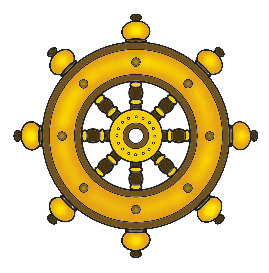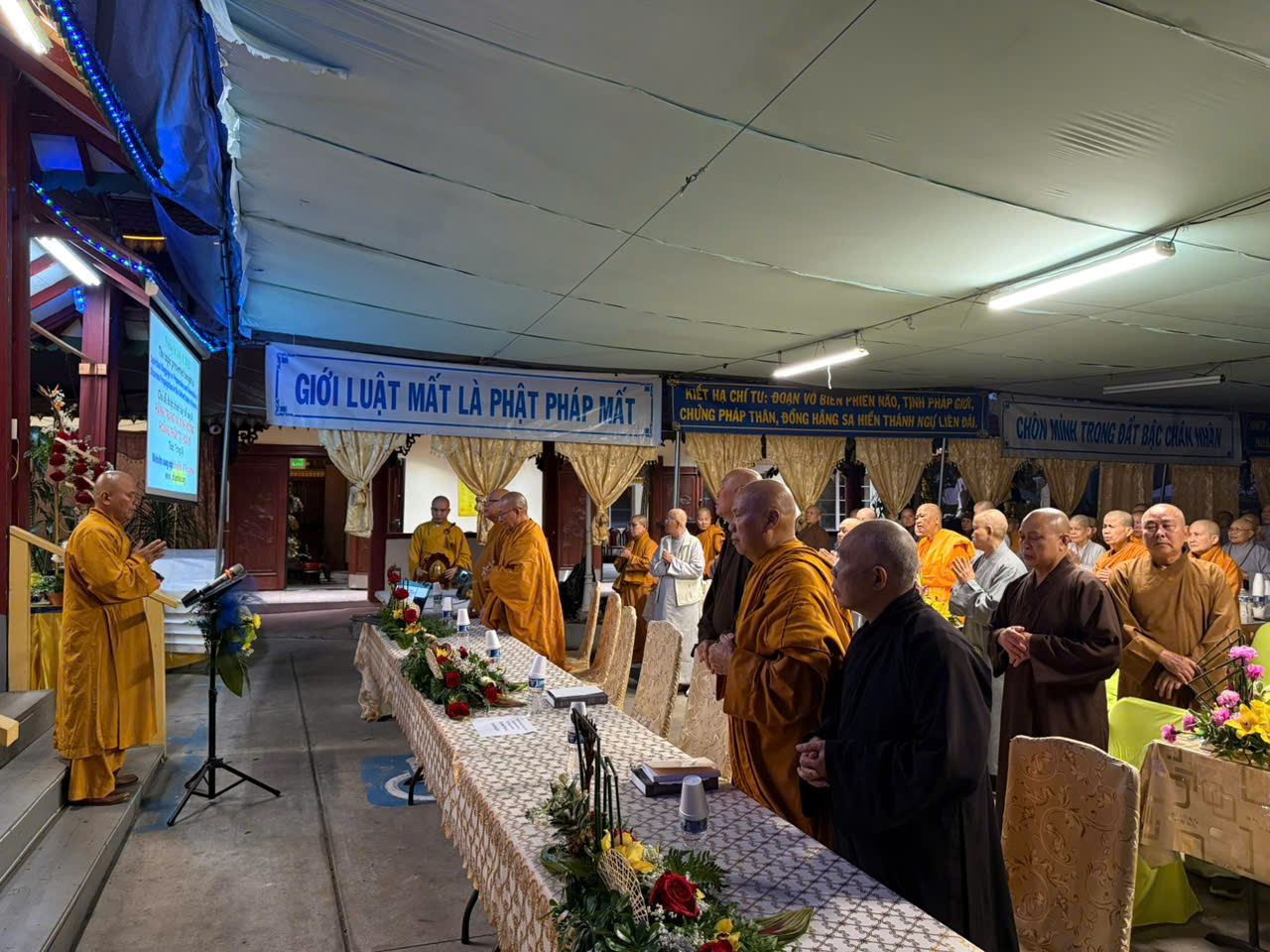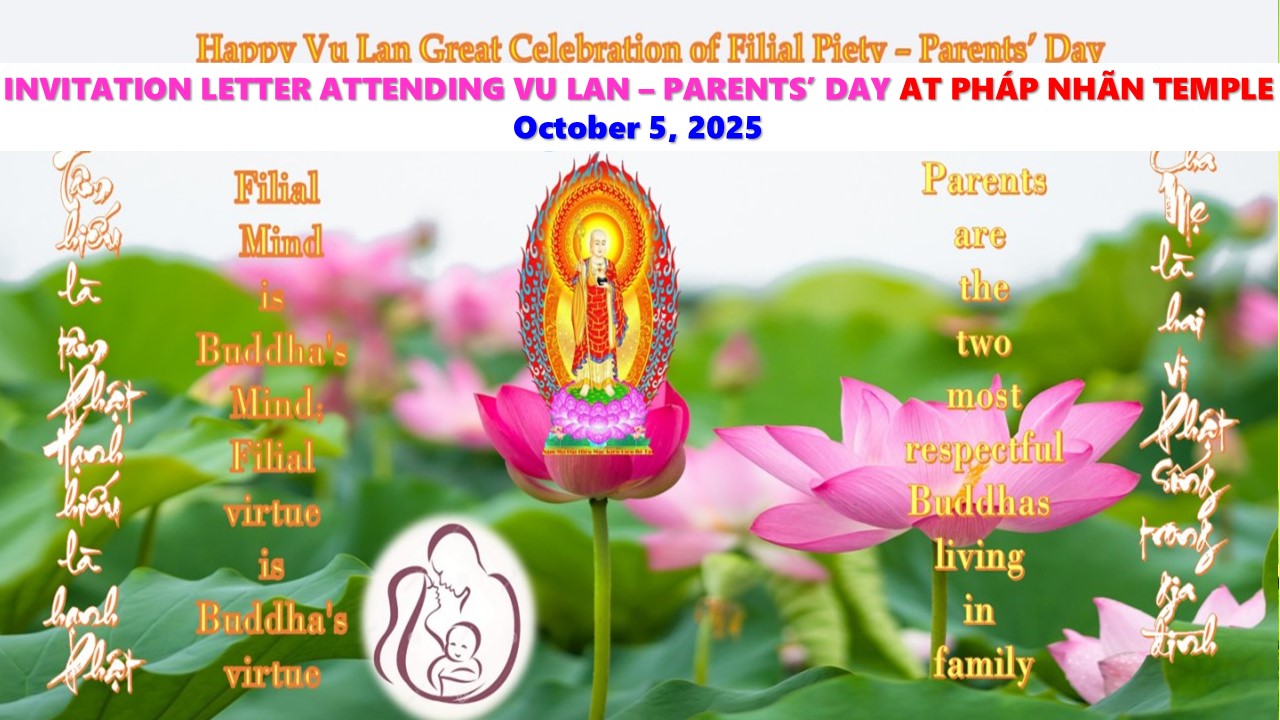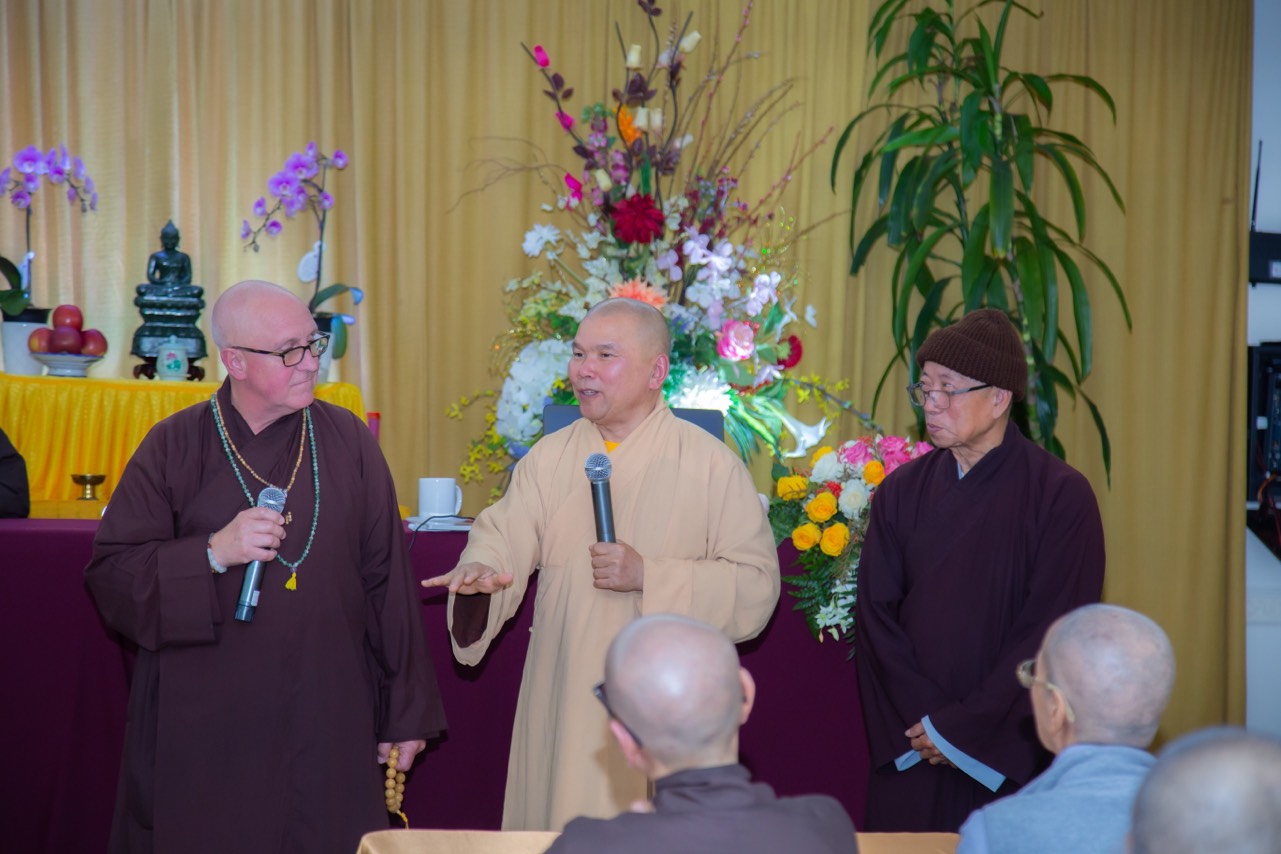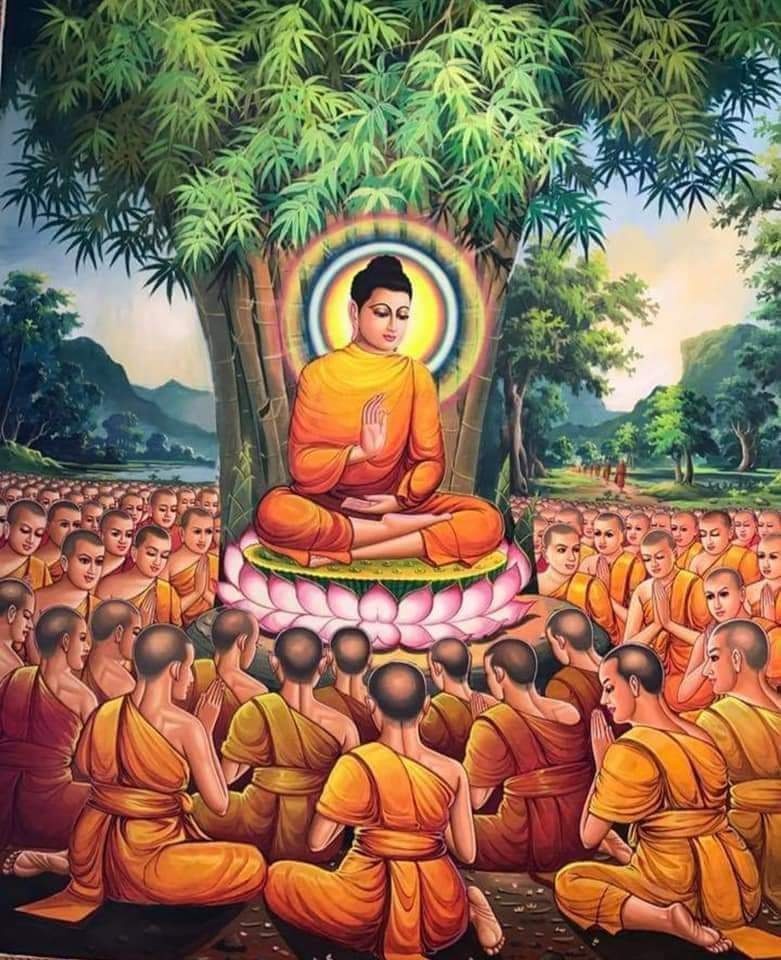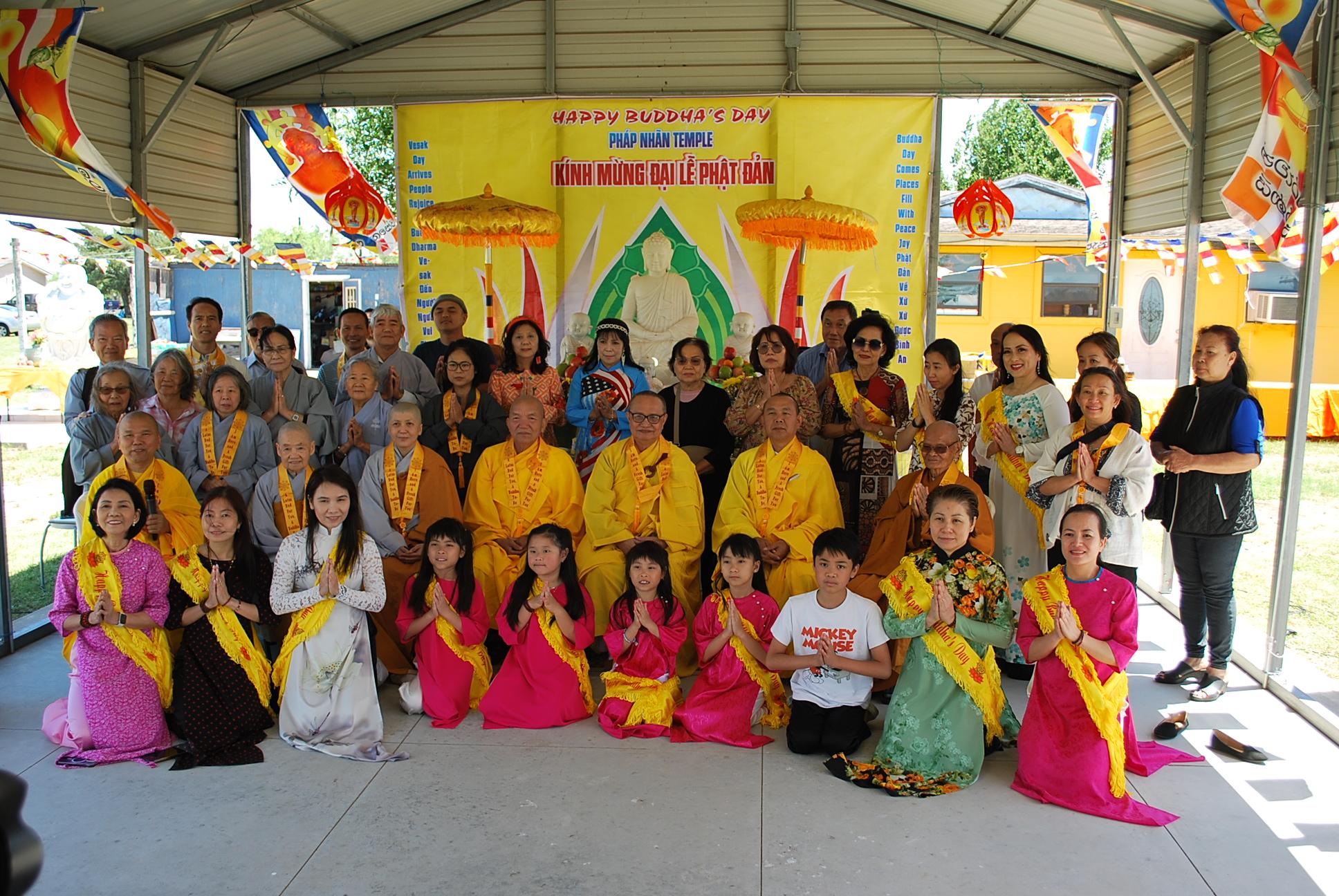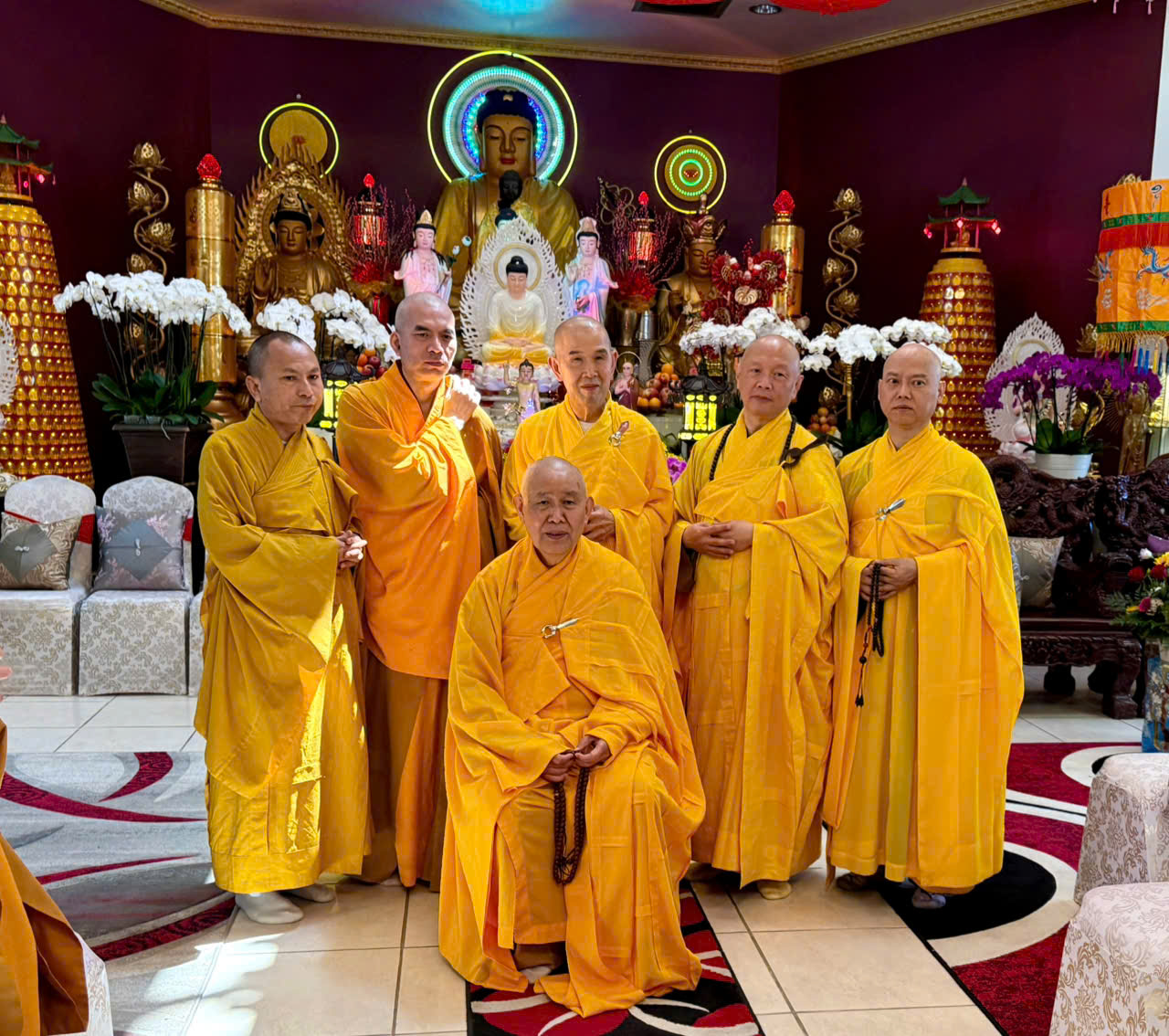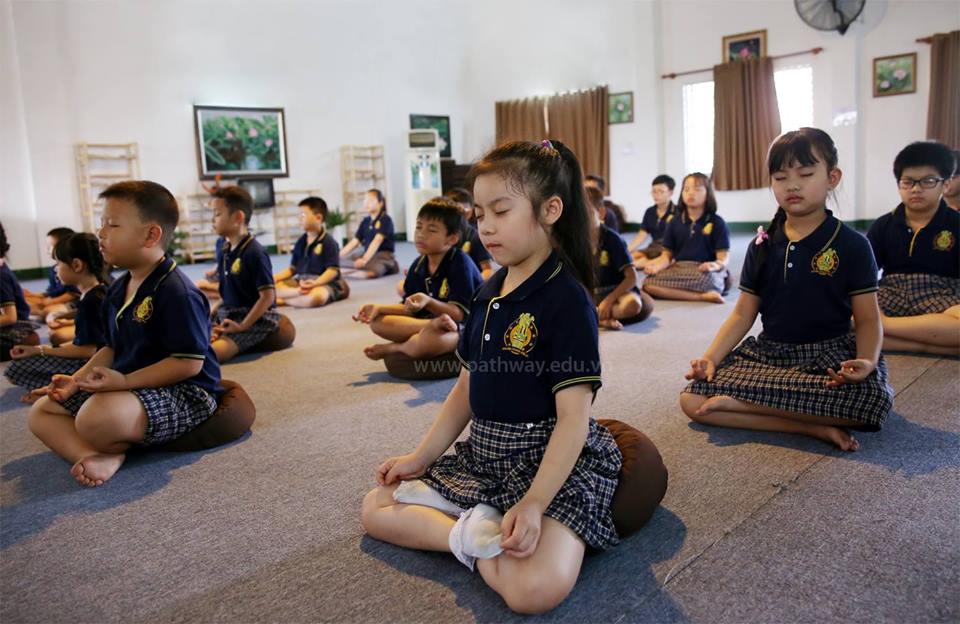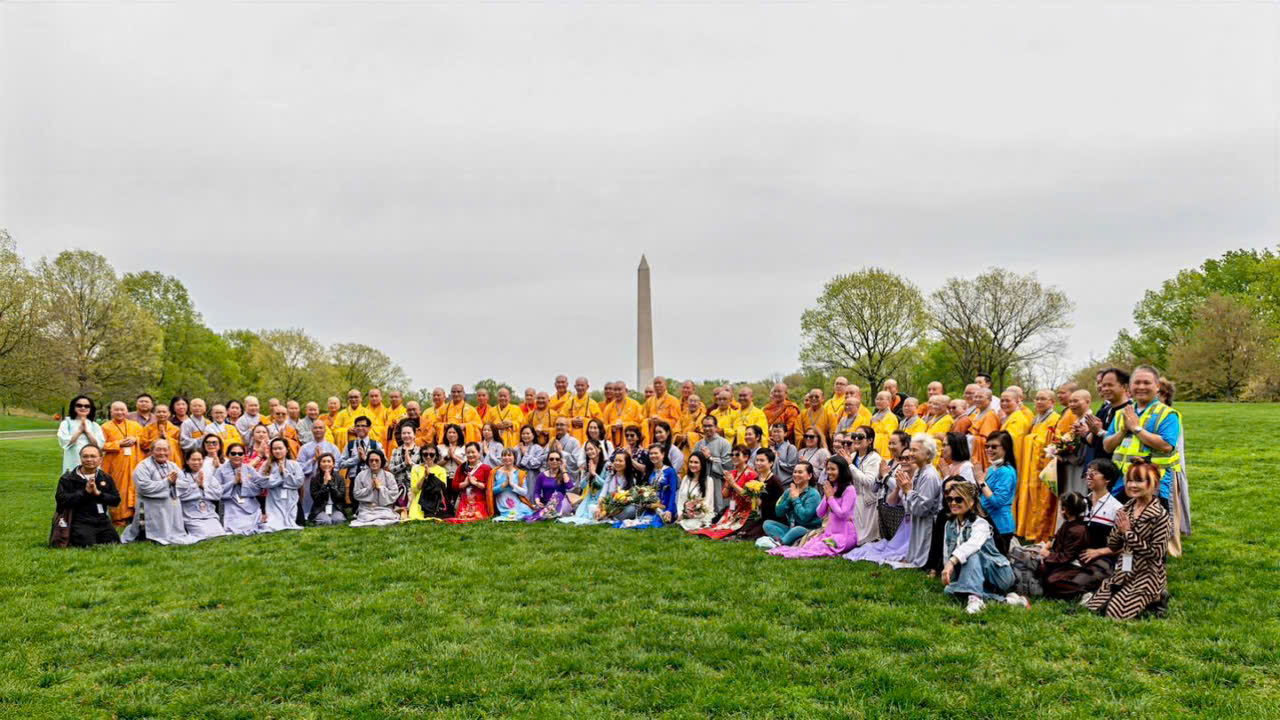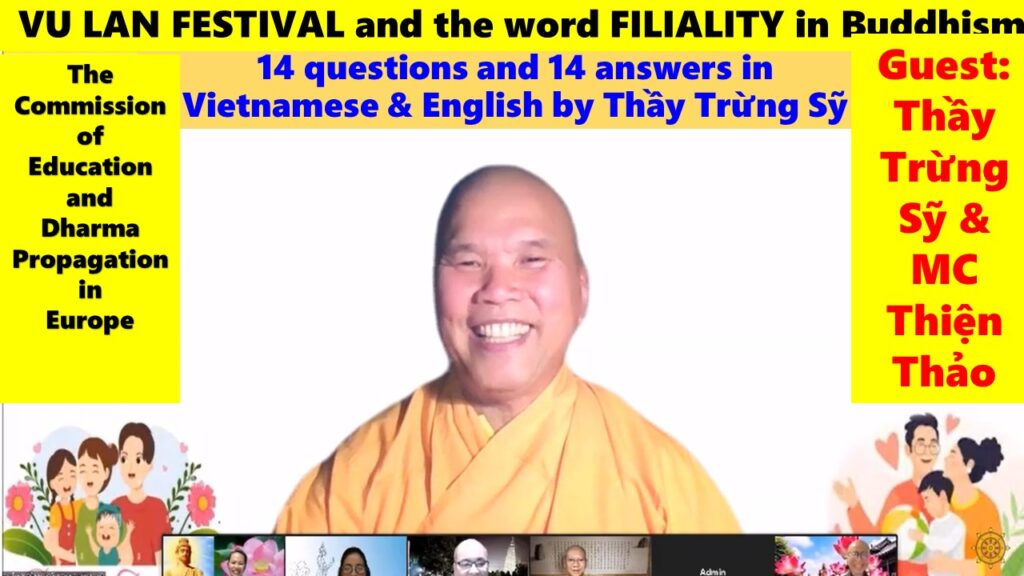
I, Thiện Thảo, would like to respectfully pay homage to Monastic people and your presence.
I would like to respectfully pay homage to Senior Venerable Thích Trừng Sỹ, a special guest for today’s Talk show, and I also welcome Buddhist friends.
We wish you all good health, wisdom, and peacefulness.
Dear the Venerable, we are extremely grateful to you accepting the invitation of the Organizing Committee and warmly welcome you. For the first time, you come to the Dharma discussion of the European Dharma Spreading Commission.
Next, we would like to have a few words to introduce the Venerable to the audience.
Senior Venerable Dharma name is Thích Trừng Sỹ
Thầy was born in 1968 in Nha Trang City, Khánh Hòa Province, Vietnam.
In 1985, Thầy has left home for monastic life at Linh Nghĩa Temple, and is an official disciple of the Most Late Venerable Master Thích Như Tịnh, the Head Monk, who founded the Linh Nghia Temple in Diên Khánh District, Khánh Hòa Province.
In 1993, Thầy was legally ordained and received higher Ordination as a Bhikkhu on the Great Precepts Transmission Ceremony of Trí Thủ I at Long Sơn Temple in Nha Trang City, Khánh Hòa Province.
In 1994, Thầy graduated with an Intermediate Buddhist Studies diploma in Nha Trang City, Khánh Hòa Province, Course I, the Second Class.
In 2001, Thầy graduated from Vietnam Buddhist University with a Bachelor’s Degree in Buddhist Studies in Sài Gòn City – Course IV, the Third Class.
In 2004, Thầy graduated from Delhi University, India, with the Master of Arts’ Degree in Buddhist Studies, the First Class.
In 2005, Thầy graduated from Delhi University, India, with a Master of Philosophy Degree in Buddhist Studies, the First Class.
In 2009, Thầy graduated from Delhi University, India, in an excellent position with a Doctor of Philosophy Degree in Buddhist Studies.
In 2012 – 2014, Thầy worked as the Dharma Teacher at Linh Sơn Temples in Austin and Leander, Texas.
At the end of 2014, Thầy and Buddhist devotees had enough good conditions to buy the land with a single home and Thầy founded and established Pháp Nhãn Temple in the vicinity of Austin, Texas.
At the beginning of 2015, Thầy has been the legal Abbot until today. There he propagated the Buddha Dharma to Buddhists and non-Buddhists in the United States of America.
In 2018, Thầy passed his citizenship exam and officially became a US citizen.
We would like to respectfully introduce a few brief words to the Venerable. (Bow)
Dear the Venerable, reading through your biography, we deeply respect your Dharma learning and Dharma practice.
In your will and vow of propagating the Dharma, you spent a lot of time making your own great effort, in order to share his experiences and guide us Buddhists to practice the Buddha Dharma and achieve peacefulness and happiness right in the present life.
Today, we vow to listen to the Master’s teachings on the topic “VU LAN FESTIVAL and the WORD FILIALITY in BUDDHISM” below so that we can have deep confidence in the Three Jewels and firmly step on the path of practice to benefit yourself and other people right now and right here in the present life.
Question 1: Dear teacher, please tell us more about the origin of the Vu Lan Festival, and the meaning of the two words Vu Lan, what do they mean?
Part I: The origin of the Vu Lan Festival dates back to when Buddha was still alive. This everyone agrees and accepts.
According to tradition, most people accept that Vu Lan’s origin dates back to the Buddha’s time, especially through the story of Venerable Maha Moggallāna, the Buddha’s second monastic disciple, who practiced, attained enlightenment, and achieved the highest supernatural power.
But according to my personal view, the origin of Vu Lan originates from the Buddha. When the Buddha attained perfect enlightenment under the Bodhi tree at the age of 35, the Buddha’s father, King Suddhodana, sent messengers from the first to the eighth people, came to invite the Buddha to visit his father again, along with his relatives and friends, and the city of Kapilavastu, where the Buddha was born, grew up, and left his royal family for monastic life.
The first time, after eight royal people were sent by the King to visit the Buddha, no one returned to the palace to report to the King at all. When arriving at Bodh Gaya, where the Buddha attained full enlightenment and taught the Dharma to his disciples, eight royal messengers came to see the Buddha and the Sangha and asked to become monastic disciples of the Buddha. They considered that the monastic life was always leisurely, calm, and free from worldly affair, so they liked it very much and asked the Buddha to allow them to live and function with the Sangha in Bodh Gaya.
The second time, obeying the invitation of King Suddhodana, the ninth person named Kālodāyin personally went to Bodh Gaya where the Buddha attained enlightenment to successfully invite the Buddha to visit the palace of Kapilavastu and his Father King Suddhodana.
We know at that time King Suddhodana was about 78 years old because the King and Queen Maya were about 43 years old, they had just had their first child. At the age of 35, the Buddha attained perfect enlightenment, and plus at the age of 43, the King had his first child. At that time, the King was about 78 years old.
Thus, at the age of 29, when Bodhisattva Siddhartha left the royal palace to become a monk, and attained perfect enlightenment under the Bodhi tree at the age of 35, the time away from his father and the royal palace was about six full years.
For the first time, the Buddha and his Sangha visited the royal palace and King Suddhodana when the King was about 78 years old. For the second time, about 5 years later, when hearing the news that King Suddhodana was seriously ill, the Buddha and the Sangha came to visit the King and the Buddha spoke the Discourse on the Characteristic of Non-self and invited the King to repeat it with the Buddha as follows:
“I am of the nature to grow old. I cannot escape growing old.
I am of the nature to have ill health. I cannot escape having ill health.
I am of the nature to die. I cannot escape death.
All things are created by my bodily action, verbal action, and mental action, I cannot let go of them, whether it is good karma or not good karma. Aware that good karma I continue to maintain and develop, and not good karma I try to recognize and transform.
All relatives, loved ones, and things I cherish today are of the nature to change. There is no way to escape being separated from them. My actions are my only true belongings. I cannot escape the consequences of my actions. My actions are the ground on which I stand.
After finishing repeating the Buddha’s teachings, King Suddhodana attained the third holy fruition of anāgāmin and then passed away. While carrying the casket of King Suddhodana, Buddha Sakyamuni personally walked in front to carry the casket of King Suddhodana.
This point reminds us that “The filial mind is the Buddha’s mind; the filial conduct is the Buddha’s conduct.” Thus, the source of filial piety originates from the Buddha himself.
Furthermore, this point emphasizes that even if we achieve enlightenment like the Buddha, even if we become a President, a Prime Minister, or a chairman, but when our father and mother are the ones who gave birth to us raised us, and taught us to become virtuous, talented, and exemplary people, then when our parents are sick and old, we must spend our most proper time in order for us to visit, encourage, and greet. When we do this well, we will be the filial children to our parents.
Except in exceptional cases, while you are applying for a green card in the United States, you are not legally allowed to visit when your parents are seriously ill or pass away. At that time, you can ask other relatives and loved ones in Vietnam to visit and take care of your parents. Once you have a green card, you can personally visit and take care of your parents after they have passed away.
Part II: The word Vu Lan, transliterated from the word Vu-lan-bon, Ullambana, translated meaning from the phrase gratitude, kindness, thankful repayment, gratefulness, thanksgivings, filial piety, etc. In the word Ullambana there is ud- √lamb literally means hanging upside down, going against moral rules of family, being unfilial to parents, the figurative meaning of this word means educating those who are unfilial to their parents become filial children, know how to be thankful and grateful in Buddhism.
According to Buddhism, in the cultural field, Vu Lan is often associated with other festivals in Buddhism, such as the joyful day of the Buddha, the Tết holiday of the Sangha, the day monastic people complete Summer Retreat, the day monastic people receive and repent mutual faults, the day monastic people have one more the age of the Dharma, the day lay Buddhist devotees have the wholesome opportunity to make the four offerings to the Three Jewels, the Full Moon offering day of the seventh month, the day to pray peace for the country and people, and the day to remember the deceased.
In the family field, the Great Vu Lan Ceremony means expressing gratitude and being grateful to Parents, two Buddhas are living in the family and have the ability to give birth and raise children to become talented and virtuous people.
Children know how to be grateful and remember their parents’ birth and upbringing; Parents are people who are grateful to their children, who have the ability to continue the family lineage and continue the life of the family lineage and ancestors.
In the field of schooling, especially in Buddhist education, the Vu Lan Festival has the meaning of educating and guiding us to become people with morality, meditation, wisdom, liberation, and liberation with right understanding.
Teachers are exemplary people who transmit Dharma knowledge and secular knowledge to us. We are students, inheritors and continue to learn, practice, create, and apply the knowledge we have learned in daily life to help ourselves and other people right here and right now in the present life.
The previous generation, teachers are the transmitters, the next generation, we are the successors. The transmission and inheritance between previous and future generations always connect together without interruption.
In the field of society, the Great Vu Lan Ceremony means being grateful for the alms and offerings of almsgivers, grateful to the guardians of the Three Jewels, grateful to the benefactors who develop mind to offer food, drinks, and medicine to us.
In a broader aspect, the Vu Lan Festival means being grateful and expressing gratitude to the countries where we were born, raise, live, and work, being grateful and remember gratitude to the national heroes, who have the ability to found, build, defend, maintain, and develop the country from ancient time until today.
Question 2: Please let us understand more about the reason why Vu Lan festival is usually held on the Full Moon Day of the lunar July and not in other months?
As mentioned above, according to Northern Buddhism, Vu Lan is often associated with the joyful Day of the Buddha, the Day monastic people complete the Summer Retreat, the Day monastic people receive and repent the mutual faults, the Day monastic people have more one the age of the Dharma, and the Day lay Buddhist devotees have wholesome conditions to make four offerings to the Three Jewels, the Full Moon Offering Day of the lunar July, the Day to pray peace and prosperity for the nation, and the Day to remember the deceased, etc.
However, every minute, every hour, every day, every week, and every month, we do good things, say good things, and think of good things that bring benefits to ourselves and other people, and then it has already been Vu Lan Day.
According to ancient conventions, Vu Lan -Parents’ Day is usually held on the Full Moon Day of the lunar July. But nowadays, Vu Lan Ceremony is often held for a whole month or more than a whole month, people often call it the season of the great Ceremony of Vu Lan.
Thus, Vu Lan has a broader meaning, with good thoughts, good meanings, good words, and good actions that mean gratitude and thankfulness in daily life, it is the Day of great ceremony of Vu Lan – filial piety in Buddhism.
Question 3: Dear teacher, usually in the Vu Lan season there is also a ceremony to forgive the sins for the dead and to make offerings to wandering souls. Please explain to us whether these ceremonies are related to the Vu Lan ceremony so that we can understand more accurately?
Looking at spiritual cultural aspects, the Vu Lan Festival in Buddhism often refers to the issue of gratitude and grateful kindness not only to the living, but also to the deceased because they have very deep interbeing and interconnected relationships with each other.
The spiritual and material cultural heritage that previous generations left for future generations to inherit is that we must be responsible for taking care of, maintaining, and developing. The purpose of worshiping and praying for the deceased has the meaning of remembering and reminding the good things that previous generations have left behind. We, the next generations, will continue to inherit and promote the things that our ancestors left much better, more creative, and more durable. Understanding and doing so, the worship and prayers between the living and the dead will have much more positive meaning.
On the other hand, looking at the religious aspect, when the Vu Lan festival comes, those who consider worshiping wandering souls and spirits as their main job, people will think that their worship is considered as a job. Sometimes, Buddhism is misunderstood as a religion of devil worship.
Buddhism always emphasizes those who become monastic people, learn, understand, practice, and apply the Buddha Dharma in daily life to recognize and transform the minds of greed, anger, and delusion into the minds of less greed, less anger, and less delusion.In short, the worship in Buddhism has the main meaning of gratitude and grateful remembrance among the living people for those who have passed away, with a positive direction, without a negative meaning. It only has a secondary meaning. Therefore, Buddhism always promotes and focuses on people learning the Dharma, understanding the Dharma, practicing the Dharma, protecting the Dharma, and propagating the Dharma to benefit oneself and other people right in the present life.
Question 4: Dear Thầy, when attending Vu Lan Ceremonies at Vietnamese Buddhist Temples, I saw there are performances of roses pinned on shirts, altars to recruit souls, ceremonies to pray for the souls of the past, going for alms, etc. According to Thầy, which features are pure features of the Vu Lan Ceremony, and which features are integrated with Vietnamese culture?
During the Vu Lan festival season, around the early 1960s, the Rose-pinning ceremony initiated by Zen Master Thích Nhất Hạnh was maintained and widely developed until today. The red rose symbolizes those who still have parents. The white rose symbolizes those who have lost both father and mother. The pink rose symbolizes those who have lost either father or mother. The yellow rose symbolizes the purity, serenity, nobility, freedom, and holiness of monastic people.
The pure beauty of the Vu Lan festival season is often mentioned by the culture of worship and prayers between the living and the deceased in the spirit of gratitude and thankful remembrance. During the Vu Lan festival season, for those who have become monastic people, there is also a very beautiful alms-begging tradition that recreates the images of the Buddha and the Sangha going on alms round in leisurely and free manners and creates good conditions for lay Buddhist devotees directly to sow blessings and make offerings to.
Besides the above meanings, the pure beauty of the Vu Lan festival season is always reminded of the spirit of gratitude and grateful remembrance expressed through the Vietnamese proverb, “When drinking water, remember the source. When eating fruit, remember the person who planted the tree.” We all know Buddhism has been present in Vietnam for more than thousands of years. Every time the Vu Lan festival season comes, Buddhists often feel grateful for the light of wisdom of the Three Jewels; grateful for the secular and Dharma teachers who have given us moral lives, meditation, and wisdom; grateful for the birth and upbringing of Parents; grateful for the contributions and offerings of donors and almsgivers; grateful for the countries where we were born, grown up, lived, and worked; grateful for the national heroes, who have contributed to founding, building, and defending the country from thousands of years ago until today; and grateful to all sentient beings across this planet.
Question 5: Dear teacher, I wonder if in other countries where Buddhism is spread, do they celebrate the Vu Lan Festival like Vietnam? If yes, in what form do they organize? Please share this.
They also organize Vu Lan festival, but other names. For example, in Japan, the Obon festival is held about 3 days starting from August 15 of the solar calendar, equivalent to July of the lunar calendar. There are folk dances, dropping lights on the river, etc.
They often write the words of wishes and hang them on bamboo trees so that their wishes come true within the year. There are warm reunion meals with family members.
In Thailand, Cambodia, Laos, Ceylon, etc., this festival is also celebrated, but they all emphasize the meaning of gratitude and grateful remembrance.
Question 6: Dear Teacher, during Vu Lan season, many people release animals to dedicate merit to their parents, so on this day, a lot of animals are captured to be sold, and many are injured to death. In your opinion, is it necessary to release living animals on Vu Lan day? Please share your perspective.
We know that the releasing of animals does not have to wait until the Vu Lan festival season to do it. The day we develop the compassionate mind, on that day we will be able to release animals.
There are two kinds of animal release: intelligent animal release and non-intelligent animal release. Intelligent animal release means animal release without creating karma. Non-intelligent animal release means animal release of creating karma either indirectly or directly. For example, intelligent animal release means that when we go somewhere and see an animal being captured, we generate a compassionate mind to buy that animal and pray that the animal takes refuge in the Buddha, the Dharma, and the Sangha, the Three Jewels. After that, we release it, it will have a longer and more spacious life.
Releasing animals unwisely means releasing animals to create karma, releasing animals to order, we have to tell people to catch 1,000 turtles, 1,000 birds, 1,000 fish, etc. We have just created indirect karma and asked others to create direct karma. In the first ethics, the Buddha taught people, whether killing oneself, or telling others to kill sentient beings, or see other people kill sentient beings that one is happy with. All are the karmas of killing. Be aware of that, as a smart persons, we arouse the compassion mind to release living beings without ordering in advance.
We know that most Indian people are about 80 percent vegetarian. In Bodh Gaya, when Vietnamese people come there to make Buddhist pilgrimages, they think the releasing of animals into the lake on the sixth week of the Buddha is sacred. In this lake, there are a lot of big fish. The Vietnamese pilgrims want numerous small fish to release into this lake. After the delegation finished praying and released the small fish into the lake, the big fish immediately ate all the small fish. This is the kind of unintelligent animal release, which means animal release to create karma. We create indirect karma and ask other people to create direct karma to catch fish for us. When we drop small fish in the lake, the big fish eat all the small fish. This karma follows another. Releasing animals like that causes local people to create karma of killing not well.
The Buddha taught that intelligent animal release and the releasing of animals does not create karma of killing, it is best for us to vow to be vegetarian in a methodical way to maintain and to maintain and develop good health for the body and mind, spend an appropriate amount of money to release animals for charity, help poor students study well, build charity houses, etc. These are the most perfect and meaningful jobs.
Question 7: Dear teacher, in addition to the filial story of Venerable Moggallāna, in Buddhism, are there sutras that teach about filial piety, please introduce them to us?
In Buddhism, what the Buddha taught is compiled into the holy Tripitaka, including Sutras pitaka, Vinaya pitaka, and Abhidhamma-piṭaka that mention very much about filial piety. In the answer to this question, the writer wants to quote some typical Sutras for you as follows:
The Sutra of Forbearance records:
“The ultimate good is nothing better than filial piety
The ultimate evil is nothing worse than filial piety.”
The Sutra of Heart and Earth Contemplation records:
“Parents living in life are like the Buddha still in the world.
Born in the world without seeing the Buddha, we skillfully take care of our parents, meaning we are worshiping Buddha.”
The Sutra of Supreme Net (Brahmajāla Sutta) records:
“All men are our fathers. All women are our mothers.
Having gone through many lives of births and deaths, we were born from there. All sentient beings in the six paths are our parents.”
The Dhammapada Verse 332 & 194 records:
Happy is to filially respect the mother and father
Happy is to pay homage to the World-Honored Buddha
Happy is to be precious and respectful to Samana
Happy is to be precious and respectful to the Sangha in Dharma practice together.”
Maha Mangala Sutta records:
“Know how to take care of our parents
Love our family
Know how to do the proper jobs
It is the greatest happiness.”
Question 8: Dear Teacher, please explain to us again the way to live according to filial piety, quoted from one of the Sutras taught by the Buddha, so that we can master and practice filial piety in Buddhism well.
The Sutra of Ekottara Āgama (Numbered Discourses) records:
“Dear disciples, there are two kinds of people to whom we cannot repay our gratitude; those are father and mother. If the left shoulder carries the father, the right shoulder carries the mother, traveling thousands of miles, providing the parents with all the food, drinks, clothes, blankets, and medicine, even if the parents urinate and defecate on the shoulder, we still cannot repay our parents’ deep gratitude.
As filial children, if we want to repay our parents’ gratitude in a practical way, we must try to create good conditions and guide our parents to live in accordance with the true Dharma by practicing the following Buddha’s teachings.
“If parents do not have confidence in the Three Jewels yet, we encourage them to have confidence in the Three Jewels.
If parents are greedy and stingy, we encourage them to develop the mind of almsgiving.
If parents do evil things, we encourage them to stop doing evil and lead them to the good path.
If parents have wrong view, we encourage them to return to right view.
If parents do not take refuge in the Three Jewels yet, we encourage them to take refuge in the Three Jewels.
If parents do not have enough opportunity to learn and practice the five ethical trainings yet, we will create enough conditions for them to learn, understand, and practice the five ethical trainings to bring benefits to ourselves and other people right in the present life.
When we understand and practice so, we have contributed to helping our parents follow the path of the right Dharma. Currently, our parents live peacefully, and in the future when they pass away, they will be born into a peaceful realm.
Question 9: Dear Thầy, the word filiality in Confucianism, ancestral religion, or according to national culture all have an individual view. According to you, what are the commonalities and differences between the word filiality in Buddhism and other religions? For example, some people believe that becoming a monastic person and leaving his parents at home is unfilial, contrary to the view of Buddhism. Please share this.
We know that the word filiality in Confucianism and Buddhism has some similarities and very specific differences. First, the word filiality in Confucianism has some similarities with the word filiality in Buddhism. The filiality in Confucianism states:
Filiality has three things: First, great filiality is to respect parents, second, not doing anything that brings disrepute to parents, and lastly, nurturing parents.
“1. Cherishing and preserving the body born by parents; 2. Establishing a good fame in life to honor your parents; 3. For parents, children must take care of their parents when they are still alive and take care of the funeral arrangements when their parents pass away.”[1]
Mencius said: “If you are not filial to your parents, you are not worthy to be a human being.”
Zeng Tzu said: “Filiality is the top of a hundred virtues. Those who are filial to parents can sympathize with the heaven, the wind and rain will be favorable. Those who are filial to parents can sympathize with earth, all things will be good and fresh. Those who are filial to parents can sympathize with human beings, happiness and fortune will get prosperous.”[2]
On the positive side, the word filiality in Confucianism encourages children to be wholeheartedly filial to their parents in the daily life.
Similar to the above meaning, the word filiality in Buddhism has the very special and surpassing meaning. In Samyutta Nikaya, volume I, the Buddha taught, dear disciples, “what is more, the mother’s milk that you drank, while you circulated in samsara for a long time, or the water in the four oceans.”
In reality, mother’s milk is no more abundant than sea water. In this sense, the Buddha emphasized that the gratitude and the upbringing of the parents cannot be repaid and cannot be fully expressed in words. Parents are the ones who provide care and nurture for their children, do not expect anything from their children in return, they just want their children to become virtuous and talented people in the family, at school, and in society.
However, children in the family are filial to their parents, the Increasing by One Āgama Sutra clearly states the following: “Dear disciples, if someone is grateful and repays the gratitude to his parents, even if he is thousands of miles far away from me, I still consider that person as standing close to me. What if someone is not grateful and does not repay the gratitude to his parents, even if that person stands close to me, but I still view him as standing thousands of miles far away from me.”
Moreover, those who are grateful and repay their parents’ gratitude in accordance with the true Dharma are considered to be the most noble people in the world. Anguttara Nikaya I, No. 306 states: “The appearance of the Tathagata, the fully enlightened One is very difficult to find in this world. People who propagate the Tathagata’s Dharma are very difficult to find in the world. People who are grateful and repay their parents’ gratitude are very difficult to find in the world. Families that have filial children are worthy of praise and offerings.”
Anguttara Nikaya I, No. 147 states as follows: “Dear disciples, families that have children who pay respects to their parents are respected and considered equal to Brahmas, to the Masters showing the way, worthy of praise and offerings.”
Indeed, the filial piety of children towards their parents not only practices in accordance with the true Dharma, but also in accordance with the laws in the world, and is praised by the Buddha and everyone through the Samyutta Nikaya I. 225 recorded as follows:
“Someone who follows the usual dharma
nurtures mother and father.
It is because of this merit
toward father and mother
Thanks to that, the sage
in this life, praise
After death, he born
enjoys peacefulness of gods.”
Through what is presented above, we know that both Confucianism and Buddhism have very similar points and alike in terms of the word filiality. Children must have filial piety, morality, politeness, respect, serve, and care for their parents, especially when they grow up, they must live meaningful lives to bring good name and reputation to the family, lineage, and society.
However, in a different aspect, the word filiality in Confucianism states: “The body including eyes, ears, nose, mouth, hair, nails, etc. is born by parents, so the body should not be damaged. Those who shave off their hair and beard modify their bodies, have surgery, and change their gender are considered unfilial people. According to the Confucian viewpoint, the word filiality mentioned in this way is not suitable for today’s society.
Furthermore, the word filiality in Confucianism is not approved by society today through the saying: “… The father tells the son to die, then the son must die. If the son does not die as the father tells him, then that son is not filial to the father.” The father tells the son to do it, but if the son does not follow what the father teaches, he is an unfilial son with the father.
In today’s social reality, there are unrighteous fathers who tell their children to do things such as killing, taking what is not given, living in sexual misconduct and adultery, violating children’s sexuality, lying, and drinking intoxicants, using drugs, but the son is conscious not to do the above wrong things.
If the son does one of the above things, he will bring suffering to himself and his loved ones. Therefore, the child determines not to do it. The words that the father teaches his children are completely incorrect and not suitable for today’s society. It is a product of the thinking of ancient feudal society in the style of where the father puts the child, the child sits there.
Today, with right view and right intention, the son no longer does or listens to what is wrong with his father, but only does what brings benefits to oneself and other people, the child decides to do.
According to the perspective of the word filiality in Buddhism, children who do not follow what their father teaches, which goes against moralities, ethics, and social laws, are filial and good to their family, school, and society. This child deserves to be cherished and praised. Thus, feudal and exclusive society, according to the old filial perspective, is completely inappropriate for people in today’s society.
On the other hand, the word filiality in Confucianism emphasizes that those who shave off their hair and beard are unfilial, those who do not get married to continue the family lineage are unfilial, or those who get married only have daughters, but do not have a boy are called unfilial. Thus, the word filiality in Confucianism states that a man must not shave off his hair and beard, must have a wife, and must have the son.
We know that in today’s society, it is normal for men to shave their hair and beard. Men do not get married; it is normal for them to live alone. When they get married, they can have either a daughter or a son, it is all right. They do not value boys more than girls, and vice versa. All sons and daughters are their children. Thus, the concept of filial piety in ancient Confucianism has no longer standing in today’s society.
For the word filiality in Buddhism, shaving off well-trained cultivators’ hair and beard is completely filial. Shaving hair and beard in Buddhism is the best makeup to help cultivators become more beautiful and have better appearances through the practice of stately and refined conduct, such as walking, standing, lying down, sitting in mindfulness, awareness, and in meditation practice.
We know that in Buddhism, monastic people must shave off their hair and beard because beard and hair symbolize afflictions. Shaving off hair and beard means shaving off afflictions on the body. Cultivating, practicing, and applying the Buddha Dharma in the daily life means shaving off afflictions in the mind to benefit oneself and other people right in the present life. Therefore, the appearance of cultivators must be completely different from the appearance of secular persons. Wearing monastic robes without shaving off hair and beard is not true monastics. When leaving the secular life and wearing monastic robes, the monastic people must shave off their hair and beard. When there are enough wholesome conditions to become monastics, the cultivators have noble aspirations to cultivate, study, and save the world to help make life happier and less suffered.
Every hour, every day, and every week, monastic cultivators should touch their own heads and remind themselves to consciously recognize and transform the afflictions of greed, anger, and delusion to lead upwards and goodness; Above, pray to learn, apply, and practice the Dharma of the World-Honored One, below, bring their own good cultivation and practice to educate other people. This is the filial act of cultivators in Buddhism towards parents and ancestors through the aspects of morality, education, and noble spirituality.
Sakyamuni Buddha, who left his royal palace for monastic life, practiced meditation, and attained full enlightenment under the Bodhi tree, returned for the second time to visit Kapilavastu and preach the Dharma to his father, king Suddhodana when the king was lying on his sick bed. Another time, the Buddha went to Tāvatiṃsa heaven to preach the Dharma to his holy Mother Maya.

In the Ullambana Sutra Commentary, the first part of this Commentary records: “Bodhisattva Siddhartha, who renounced the royal throne, became a homeless hermit, achieved perfect enlightenment,” whose title is Sakyamuni Buddha, determined to save his parents and all living beings.”
Through the exemplary image of the Buddha, as monastics, we determine to study the Buddha Dharma diligently to dedicate blessings to our parents, advise our parents to believe deeply in cause and effect, to believe deeply in the Three Jewels, advise parents to abandon evil and do good. This is the best way for monastics to show filial piety to their parents not only in one life, but also in many other lives.
On the other hand, the word filiality according to different perspectives in Confucian funeral is performed as follows: 1. Observing the auspicious date and time for the deceased. 2. Killing animals to sacrifice for the deceased, then hosting a feast for those attending the funeral. 3. Crying a lot while the funeral is happening. 4. Burning votive paper or hell money for the deceased.
On the contrary, the word filiality in Buddhist funeral does not agree with the above views. Buddhism does not accept good or bad days and hours. The Buddha taught that good or bad days and hours depend on the good and bad karma we create and cause.
For example, today is a good day, but if we do unwholesome deeds such as killing, taking what is not given, then today, good day becomes a bad day. On the contrary, today is a bad day, but if we do good deeds, such as helping needy people and making offerings to the Three Jewels, then today, bad day will become a good day.
In Buddhism, when a family member dies, the family members vow to eat vegetarian food and offer vegetarian food for the deceased. They do not cry. On the contrary, they spend time chanting sutras, sitting meditation, and reciting Buddha’s name to send wholesome energies to the deceased. To protect a safe and green environment, they are aware that they should not burn votive paper, they spend money helping and supporting poor studious students, etc.
In Buddhism, the word filiality is specifically expressed through two aspects, material and spirituality. In terms of material aspects, when parents are old and weak, children have the responsibility to take good care of their parents completely.
Aṅguttara Nikāya, the Chapter Four Dharmas, Karma Merit, states: “Parents are likened to Brahmas, the Teachers, and the gods. Therefore, filial children must respect their parents by offering food, drink, clothing, bedding, bathing, and massaging their bodies, limbs, and feet to their parents.
In terms of spiritual aspects, children know how to guide their parents to let go of evil dharma and lead them to the true Dharma. The Dharma Repentance Sutra, No. 142 clearly states: “If parents are stubborn, deluded with wrong view, do not believe in the Three Jewels, are aggressive, wicked, cruel, inhumane, and cause many bad karmas, then filial children must know how to advise parents to abandon evil and do good, arouse good minds, return to the right path, stay close to good friends, open Bodhi mind, practice meditation, recite Buddha’s names, make parents often feel peaceful.”
In Anguttara Nikaya I, No. 75, the Buddha has taught that children have the duties and responsibilities to skillfully guide their parents into the true Dharma as follows:
“Dear disciples, parents do not have confidence in the Three Jewels yet, then filial children encourage them to have confidence in the Three Jewels. Parents do not understand cause and effect yet, then filial children encourage the parents to believe deeply in cause and effect. Parents have evil precepts, then filial children encourage the parents to have right precepts. Parents have a greedy mind, then filial children encourage the parents to arouse an almsgiving mind. Parents have wrong view, wrong intention, wrong speech, etc., then filial children encourage the parents to have right view, right intention, right speech, etc.“
When they understand and practice well like that, children have the ability to be grateful and repay the gratitude to the parents deeply.
On the other hand, the material and spiritual aspects include the relationships of responsibilities and duties between children and parents in a moral and educational family, in the Dīgha Nikāya, No. 31, Sigalovāda Sutta, or Thiện Sinh Sutra, the Buddha taught filial piety to everyone clearly as follows:
Towards their parents, children have 5 duties:
- Providing necessary material and spiritual needs for their parents.
- Helping do the hard work for your parents.
- Protecting kinship dignity and family tradition.
- Maintaining inheritable property.
- Having the responsibility to look after funeral in accordance with the right Dharma when parents pass away.
Towards their children, parents have 5 duties:
- Teaching their children to do good, not to do evil.
- Advising them to be close with experienced teachers, good friends, and wholesome environments.
- Suggesting and choosing the right careers for children.
- Building a good wife and husband for the children.
- Giving inheritance rights and benefits to children at the right time.
In summary, looking at the moral and educational aspects of happy families, the word filiality always emphasizes filial children, exemplary parents, and a family with cultivation.
Through what has been discussed above, the word filiality in Buddhism and Confucianism have similarities. In this part, we need to maintain and develop morality and educate family and society. However, in terms of the difference between the word filiality in Buddhism and Confucianism, we must learn to select the meaning of filial piety in a way that is suitable for people and society today in the 21st century.
In Buddhism, the word filial piety often refers to both material and spiritual aspects, especially the spiritual part. This spiritual part is the moral part and noble education. In Buddhism, it is always appreciated, praised, and praised by Buddha and people. It has the ability to surpass all education and filial piety in life.
Question 10: Dear teacher, what do you think about the situation of Vietnamese people living abroad? When their children grow up and move out to live on their own, Parents respect the freedom of their children, so parents accept to live alone. They only have the opportunity to see each other on weekends. When old parents do not want to bother their children, so they go to a nursing home, or ask other people to pay for the nursing, etc. Dear Thầy, do you have any advice for Vietnamese families? How to create a lifestyle and to fulfill filial piety appropriately according to the circumstances of Vietnamese people living overseas?
We know that families are the cells of society. Families with good education and ethics contribute to helping a good society, and vice versa. Families without good education are a great burden to society.
In the past, Vietnamese families were often complex families, with two or three generations living together, but today due to the influence of social and national development, Vietnamese families get often single families.
In Western culture in general, single families are normal. Children have just grown up 18 or 20 years old, they want to leave their family to live independently because of their education and jobs, they have to live separately. However, in order for children to know the filial piety and morality in the family, first of all, parents must be exemplary people and do not drink intoxications in the whole day and night.
When children are young, parents need to send them to Vietnamese Buddhist Youth Association to help them have a healthy environment, play with good friends, speak Vietnamese, learn Vietnamese culture, sing Vietnamese, and learn the Buddha Dharma in Vietnamese. If parents know how to create a healthy playground for their children, then gradually their children will easily integrate into Vietnamese culture and learn good things from exemplary Buddhist youth friends and leaders.
Try to educate your children when they are young. Do not wait until your children are grown up for their parents have to start providing guidance, by then it is already too late. Let’s bend bamboos while they still have shoots. Guide your children when they are still like blank sheets of paper. Do not wait for them to grow up like black sheets of paper. At that time, it will not be easy for you to guide and teach them at all because their heads were filled with worldly knowledge and unhealthy habits in life.
To cherish the presence of loved ones in your families, when children are young, your families should have reunion meals during the day. When children grow up, your families try to create good opportunities to meet each other on weekends, or when children are busy studying or doing business far away, your families try to create meetings at the end of the month. etc. If you can organize regularly like that and become a good habit, then the culture and education in your families will be easier to warm up and become warmer.
When parents are in a nursing home, children have the responsibility to visit their parents when they are old. As long as parents see their children, they feel peaceful and happy. To take care of and support their parents much better, there are Vietnamese families who just want to take care of their parents at home, they do not want to send them to the nursing home. However, depending on the different circumstances of each family, we can flexibly and skillfully take care of our parents in a way that is appropriate to current society.
Question 11: Dear Thầy, in the case of children who understand the Buddha Dharma, their parents do not even though the children have tried to convince and advise their parents. Dear Teacher, do you have any specific instructions for such families? At least what good things should children create for their parents?
In the case of children understanding the Dharma, parents do not understand the Dharma. To convince parents to understand the Dharma, first of all, children must demonstrate that they are true Buddhists, who study the Dharma, understand the Dharma, practice the Dharma, protect the Dharma, and contribute to propagating the Dharma. Children are those who learn, understand, practice, and apply the five moral trainings in the daily life to benefit oneself and other people right here and right now in the present life.
As true and intelligent Buddhists, we skillfully know how to guide our parents to learn, understand, and practice the Buddha Dharma. Nowadays, with wi-fi internet, every day we can open YouTube for our parents to listen to monastic Teachers explaining the meaning of cause and effect, the right confidence in the Three Jewels, the meaning of right view and wrong view, etc.
We can use the method of raining a lot of soaking the ground. Today and tomorrow, we would like to invite our parents to listen to the Dharma gradually, then they will absorb the Buddha Dharma more easily.
At the Temple, there are the Buddha Vesak Day and Vu Lan Ceremonies. We would like to invite our parents to go to the Temple to contact and interact with the Dharma friends. Gradually, our parents will be happy to follow the Buddha’s teachings.
Question 12: Dear teacher, according to Buddhism, for parents who have died in this life, or in many previous lives, can children be filial to their parents? Please tell us and explain further why this filial piety is effective?
The Buddha taught that people in this life must go through four cycles: Birth, aging, illness, and death. When we look at the physical aspect, if our parents die for a year or many years, we call them completely lost, but according to the interbeing view of Buddhism, especially the spiritual view, our parents are not lost. Our parents are always present in our own cells and lives. Wherever children are, parents are present there, and vice versa, wherever parents are, children are present there, manifesting in the stream of conscious mind, words, thoughts, and actions in the daily life.
When we do good things, speak good things, and think about good thoughts, when we know how to take refuge in the Three Jewels, learn, understand, and practice the Buddha’s teachings correctly, specifically the five full moral precepts, then our parents have been present in our lives. Parents are present in freshness, peace, and happiness with ourselves. On the contrary, when we do evil, think of evil, and say evil, our parents are also present in our own daily life, but present in unhappiness and suffering with ourselves. Because of the evil that we have created, our parents are influenced by the evil from us. we are aware that as filial children to our parents in every second, every minute, every hour, and every day, we vow not to do evil, vow to do good deeds, and keep our minds pure, that is what the Buddha taught.
In short, physically, after our parents pass away, we see that they have lost, but spiritually, our parents have never lost. When we understand and practice this well, we can be grateful and repay our parents’ gratitude already. Therefore, we skillfully apply Buddha’s teachings into the daily life in a flexible and appropriate way so that we can bring the flowers and fruits of peacefulness and happiness to the many right in the present life.
Question 13: Please tell us in more details, in Buddhism, how seriously is the sin of unfilial piety considered?
We know that normally in the world, those who commit the sin of being unfilial to their parents will be despised and abandoned, let alone in Buddhism. They are people who not only lost their spiritual roots and bloodline, but also lost their moral foundation and family education.
By the method of comparing the gratitude for parental birth, upbringing and the sin of being unfilial to parents, the Sutra of Repaying Parents’ Gratitude clearly states the following: “The gratitude for parental birth and upbringing is immeasurable, then the sin of being unfilial to parents is also immeasurable.”
In the Sutra of Patience, the Buddha taught: “In the highest goodness, there is nothing as good as filial piety, but in the ultimate evil there is nothing as bad as unfilial piety.”
The sin of being unfilial to parents through many different teachings is as follows: Not listening to the correct teachings of parents, spending and destroying the property made by parents, living dependently on the sweat and effort of parents, causing parents to struggle all day long to earn a living.
Committing the five ethical things: 1. Killing. 2. Stealing. 3. Living sexual misconduct, adultery, and violating children’s sexuality. 4. Lying, saying harmful things to other people. 5. Taking intoxicants, drugs, gambling, etc.
The Anguttara Nikaya, volume 1, 738, states: “Dear disciples, there are five sins that lead to the lower realms, to hell, cannot be cured. What five? 1. Killing the father, 2. Killing the mother, 3. Killing the Arahant, 4. With malice to make the Tathagata bleed, 5. Destroying the harmony of the Sangha.”
The Anguttara Nikaya I, 637 clearly states: “Those who do evil to their parents, speak evil to their parents, think about evil to their parents; not being grateful and not repaying the gratitude for the parental birth and upbringing, they suffer in the present life, and after death, they will be fallen into a hell.”
Thus, those who commit the sin of being unfilial to their parents have lost their own human dignity. Throughout their lives, they had bad reputations with their relatives and loved ones in the family, lineage, and in society.
After death, unfilial people will definitely be fallen into the hell of darkness, stupidity, being obscured by ignorance, not knowing cause and effect, not knowing karma and retribution, and not knowing the Buddha Dharma. That is the heaviest retribution for children who are not filial to their parents.
Question 14: Dear teacher, young people overseas receive a different education than the Vietnamese tradition or Buddhism. Therefore, acceptance and practice of filial piety with parents are very rare and often lead to conflict. But the sin of being unfilial piety is very serious, so please, dear Thầy, give parents some guidance on how to educate their children, guide them to a filial lifestyle, without being strict, without imposing constraint so that young people will not be accused of the unfilial sin later on.
We all know that young people are born, grow up, live, study, and work in Western society, they come into contact with and absorb the Western culture very quickly. In order for children to understand Vietnamese culture, ethics, education, traditions, and Buddhism, first of all, parents that must be exemplary people live with the responsibility and duty, spend proper time directly instructing children when they are still young.
We are aware that when children are young, they are like blank sheets of paper and are exposed to the teachings and education of their parents very quickly in the family. Do not wait until your children are grown up, it is not easy for their parents to guide them. Because in their heads, they are filled with the material culture of Western enjoyment. At that time, parents spend a lot of time educating their children, but it is not easy to successfully educate their children to become virtuous and talented people.
We know that although young people have the opportunity to learn and interact with Western culture very quickly, for the love of parents and family, no culture can deny it. The important thing is, in a family with culture, ethics, and education from a young age, parents must be exemplary teachers who skillfully teach their children both materially and spiritually when they are still young. Do not wait for them to have grown up, parents just begin to spend time teaching their children. At that time, it is already too late.
Parents must spend appropriate time being close and taking care of children. Parents are sometimes their teachers, their siblings, and their friends. Daily, parents can play many different roles with them in life. Do not let them have a lot of free time to hang out on the internet and watch depraved and violent movies, they will be damaged. Be aware of educating children when they are still young. Do not wait for children to have grown up, and then parents can just guide and educate them. At that time, parents will find it much more difficult to guide and educate their children.
According to the law of cause and effect, filial family between you and your children depends on the filial piety between you and your parents. Vietnamese folk songs have a saying:
“If you are filial to your parents, then later on, your children are filial to you, it makes no difference. If you live in no filial piety with parents, do not expect your children to be filial to you, it is useless.”
In short, if you want your children to understand Vietnamese culture, traditions, and Buddhism, as skillful parents, you must be exemplary people who know how to spend your proper time guiding and educating your children when they are still young.
Indeed, when children are educated by their parents from a young age, they will easily listen to and quickly absorb what their parents have taught. They know how to be respectful and filial to their parents and ancestors.
As smart Buddhists, you know how to guide your children and grandchildren to go to Buddhist family activities at Buddhist Temples to learn Vietnamese and learn the Buddha Dharma in Vietnamese, then your children will clearly understand the root of culture, Vietnamese tradition, and Buddhism in an easy and nice way.
Wishing you success in teaching and educating your children to be good and talented people overseas.
May you be peacefully dwelled and imbued in the Dharma of the World-Honored One
A few comments from Reader
Namo Buddhaya
Dear Teacher, it is truly wonderful and admirable to see your writing in such precise details about your Dharma talk in bilingual that no other teachers have ever accomplished, Moreover, my experience of learning and researching Buddhism for 15 years following the 10/24 hours has helped me have feelings when listening to Dharma talks in the lectures of our Australian teachers. But recently, I have paused and looked back at myself because in the boundless ocean of learning, I have found learned teachers who have made me respect and admire them to the end.
Moreover, I have realized how to see myself and contribute a few small shares that I have experienced so that those with the same background can sympathize with each other, so I often appear on the internal pages of your own temple’s ashram, or of my closest friend back home.
However, I promised myself that I would not miss a single lecture from the lecturers through the Commission of Education and Dharma Propagation in Europe and Australia for many months without writing anymore, just thinking in my heart and learning. But on Thursday, October 12, 2023, with your lecture, I found a pure meeting of the Southern and Northern sects as I am pursuing and admire you very much.
(By the way, I let you know that I am a disciple of Master Viên Minh who took refuge for me in Australia.)
I respectfully have a few words to say to you and wish you good health.
Sincerely in the Dharma,
Lay female Buddhist Huệ Hương in Australia
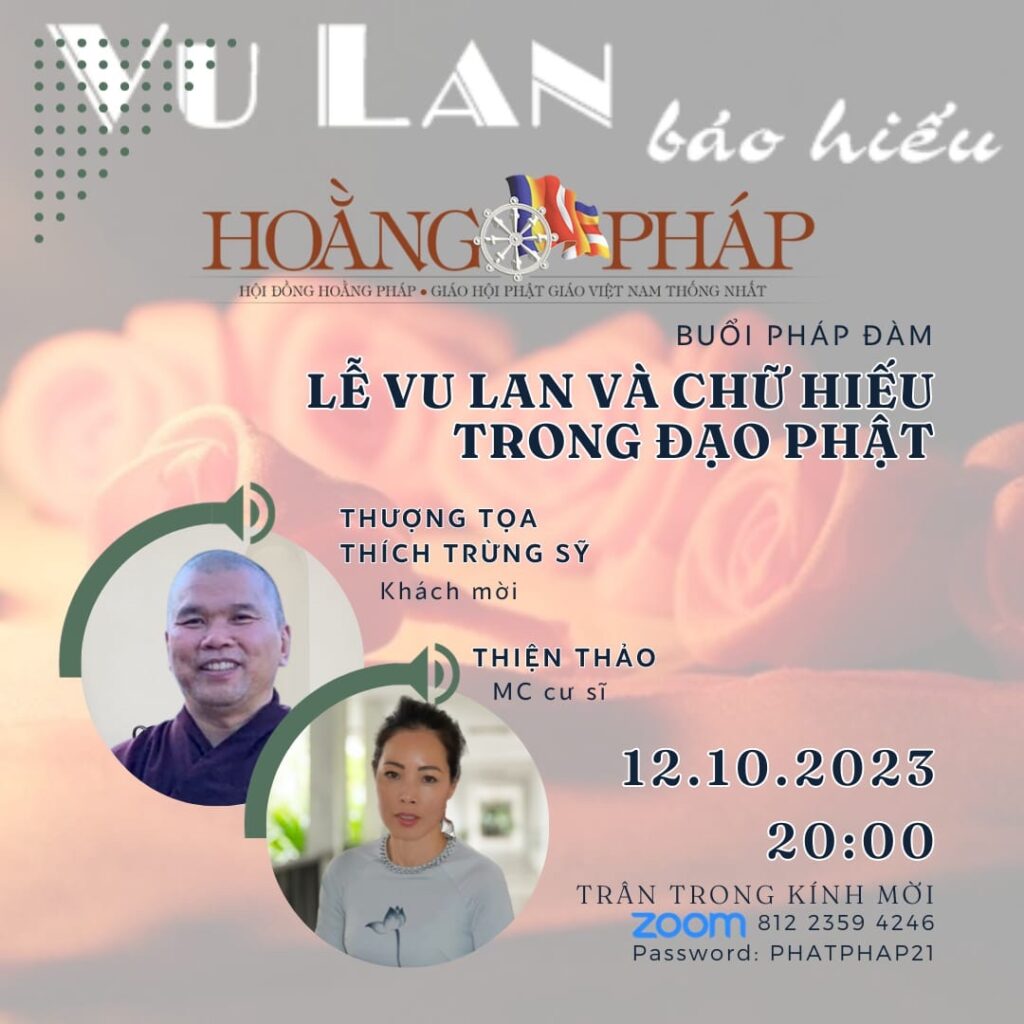
https://phapnhan.org/tv/le-vu-lan-va-chu-hieu-trong-dao-phat/
.
[1] Thích Nhật Từ (Biên tập), Nền Tảng Giáo Dục Phật Giáo Về Đạo Đức, Nxb. Tôn Giáo, 2019, tr. 445.
[2] Tạ Thanh Bạch (dịch chú), Minh Tâm Bửu Giám, Nxb. Thanh Hóa, 2003, tr. 55.

